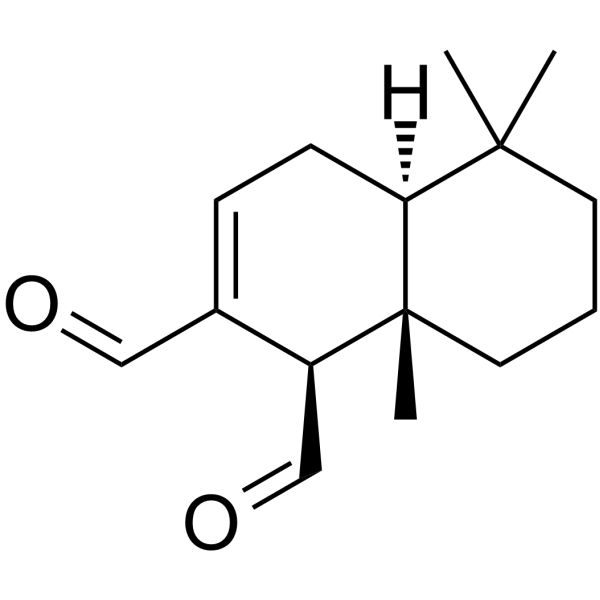
Polygodial
CAS No. 6754-20-7
Polygodial( Tadeonal )
Catalog No. M27687 CAS No. 6754-20-7
Polygodial is an antifungal potentiator and an antibiotic, particularly against Saccharomyces cerevisiae, Candida utilis, and Sclerotinia libertiana.
Purity : >98% (HPLC)
 COA
COA
 Datasheet
Datasheet
 HNMR
HNMR
 HPLC
HPLC
 MSDS
MSDS
 Handing Instructions
Handing Instructions
| Size | Price / USD | Stock | Quantity |
| 5MG | 178 | Get Quote |


|
| 10MG | 282 | Get Quote |


|
| 25MG | 480 | Get Quote |


|
| 100MG | Get Quote | Get Quote |


|
| 200MG | Get Quote | Get Quote |


|
| 500MG | Get Quote | Get Quote |


|
| 1G | Get Quote | Get Quote |


|
Biological Information
-
Product NamePolygodial
-
NoteResearch use only, not for human use.
-
Brief DescriptionPolygodial is an antifungal potentiator and an antibiotic, particularly against Saccharomyces cerevisiae, Candida utilis, and Sclerotinia libertiana.
-
DescriptionPolygodial is an antifungal potentiator and an antibiotic, particularly against Saccharomyces cerevisiae, Candida utilis, and Sclerotinia libertiana.(In Vitro):When tested on S. cerevisiae, polygodial proved to be fungicidal rather than fungistatic. When the cells of S. cerevisiae are treated in vitro with polygodial for 10 min, the cell membrane becomes severely damaged, and many vesicles, possibly formed from the fragmented cell membrane, can be observed within the cytoplasm.(In Vivo):Polygodial (0.1 to 10 mg kg(-1), i.p.) produced significant inhibition of acetic acid, kaolin and zymosan-induced writhing in mice, being about 14 to 27-fold more potent than the hydroalcoholic extract at the ID50 level.
-
In VitroPolygodial exhibits fungicidal activity against?Saccharomyces cerevisiae,?Candida albicans, and other fungal pathogens in standardized susceptibility tests (NCCLS). Polygodial (12.5 μg/mL, 3 hours) induces significant shrinkage compared to controls inSaccharomyces cerevisiae cells with the minimum fungicidal concentration (MFC) for 106?CFU/mL in RPMI 1640 medium. Cell Viability Assay Cell Line:S. cerevisiae cells Concentration:12.5 μg/mL Incubation Time:3 hours Result:Treated cells exhibited significant shrinkage compared to controls, and the organization of subcellular organelles appears either disrupted or compacted.
-
In VivoPolygodial is a sesquiterpene isolated from the barks of Drymis winteri (Winteraceae). Polygodial (0.5 to 10 mg/kg; 0.5 h; given by i.p. route to mice) induces significant, dose-related and almost complete inhibition of Acetic acid, Kaolin and Zymosan-induced abdominal constrictions. The calculated mean ID50 values are 0.8, 2.1 and 2.6 mg/kg and maximal inhibitions of 90.0±3.0, 98.0±1.0 and 97.0±2.0 %, against Acetic acid, Kaolin and Zymosan, respectively. Polygodial is about 14- to 27-fold more potent than the hydroalcoholic extract (HE) at the ID50 level. Animal Model:Non-fasted male Swiss mice (20-30 g) or male Wistar rats (150-180 g) Dosage:0.1 to 10 mg/kg Administration:Injected i.p. 0.5 h before the injection of irritant substances Result:Produced significant inhibition of Acetic acid, Kaolin and Zymosan-induced writhing in mice.
-
SynonymsTadeonal
-
PathwayGPCR/G Protein
-
TargetAntibacterial
-
RecptorTNF-α
-
Research Area——
-
Indication——
Chemical Information
-
CAS Number6754-20-7
-
Formula Weight234.339
-
Molecular FormulaC15H22O2
-
Purity>98% (HPLC)
-
SolubilityIn Vitro:?DMSO : ≥ 100 mg/mL (426.75 mM)
-
SMILES[H][C@@]12CC=C(C=O)[C@H](C=O)[C@@]1(C)CCCC2(C)C
-
Chemical Name——
Shipping & Storage Information
-
Storage(-20℃)
-
ShippingWith Ice Pack
-
Stability≥ 2 years
Reference
1.Cao Y, et al. Identification of a ligand for tumor necrosis factor receptor from Chinese herbs by combination of surface plasmon resonance biosensor and UPLC-MS. Anal Bioanal Chem. 2016 Jul;408(19):5359-67.
molnova catalog



related products
-
LL-3858 dihydrchlori...
A novel anti-TB agent that has an MIC range of 0.06-0.5 ug/mL.
-
N-(Ketocaproyl)-D,L-...
N-(Ketocaproyl)-D,L-homoserine lactone is a quorum sensing (QS) autoinducer.
-
Chicoric Acid
Chicoric Acid is a potent inhibitor of human immunodeficiency virus type-1 (HIV-1) integrase and the replication in tissues.



 Cart
Cart
 sales@molnova.com
sales@molnova.com


